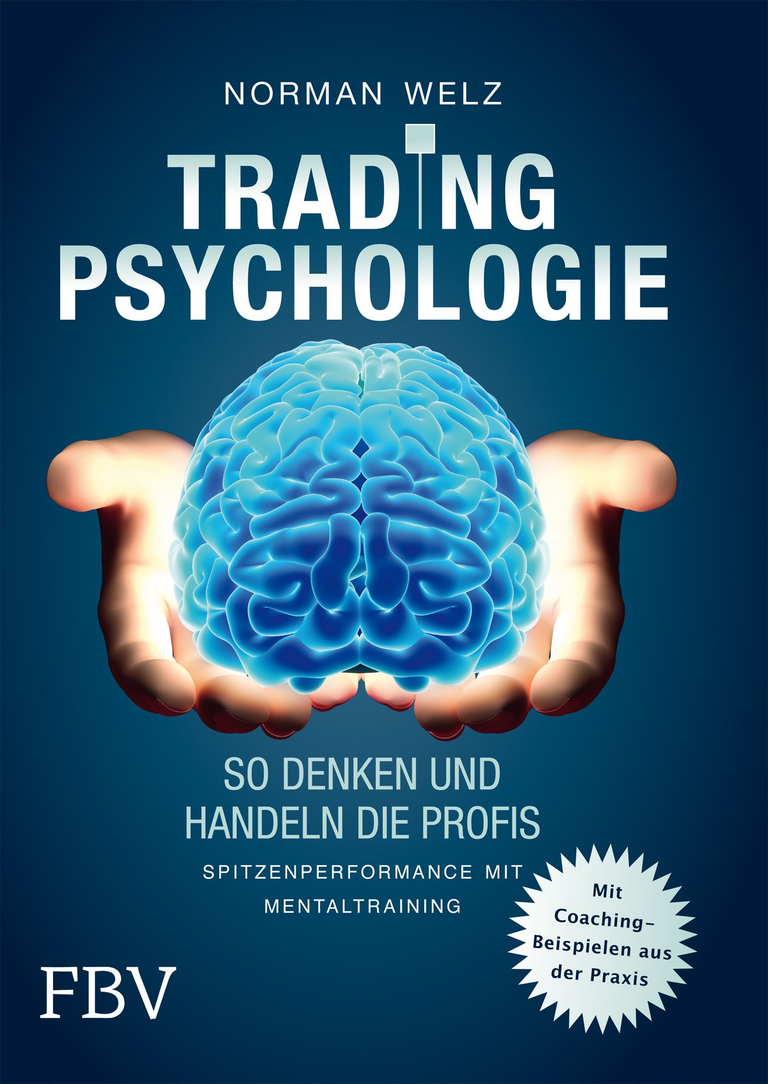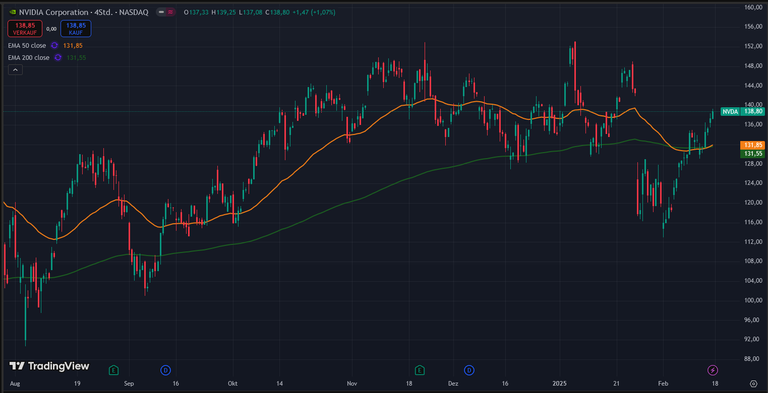Ein gutes Buch nicht nur für Trader
A good book not just for traders
Deutsch:
english below ⬇️

Wer bremst verliert?
Zitat des Klappentextes:
Der größte Feind des Traders ist die Angst. Wer Angst hat, verliert. Und beim Traden heißt das bares Geld. Finanzpsychologe, Mentaltrainer und Trader Norman Welz erklärt, was Angst im Tradingalltag anrichtet. Vor allem aber demonstriert er, wie sie sich beherrschen lässt. Er begleitet den Leser in seiner Entwicklung als Trader und zeigt viele praktische Wege auf, wie man Angst und Stress in den Griff bekommt, ausgeglichen wird und lernt, sich zu konzentrieren. So ist Börsenerfolg in Zukunft kein Zufallsprodukt einer positiven oder negativen Grundstimmung oder der persönlichen Disposition, sondern eine Folge kontrollierten Tradens.
Das Standardwerk enthält einen umfangreichen Überblick über die Psychologie des Tradens. Die klassische Evolutionsbiologie findet ebenso Anwendung wie Behavioral Finance, Persönlichkeitsforschung und die neuesten Erkenntnisse der Neurowissenschaften und der Angstforschung.
Lernen Sie, wie Sie Angst als Stör- und Verlustfaktor beim Traden erkennen und beherrschen.

Nvidia Chart - rauf oder runter?
Wer kennt das nicht, egal ob bei Aktien, Krypto, Gold oder sonst einer Investition. Ist jetzt der richtige Zeitpunkt einzusteigen? Oder eher auszusteigen? Gewinne mitnehmen oder laufen lassen? Verluste begrenzen oder geht es jetzt endlich wieder bergauf? Wenn ich jetzt verkaufe entgehen mir dann Gewinne?
Immer wieder die gleiche Situation, die gleichen Fragen und ja eben auch immer wieder die gleichen Emotionen. Ängste, Zweifel, Gier, Fomo, ...
Dieses Mal mache ich es anders. Dieses Mal mache ich nicht den gleichen Fehler wie vor 2 Wochen, 3 Monaten, vor 3, 5 oder 10 Jahren.
Aber geht es nur dem Trader so? Geht es nicht jedem von uns immer wieder so? Egal ob in der Schule bei einer Klassenarbeit, im Beruf, im Freundeskreis, der Beziehung, Familie?
Eigentlich ist doch im Nachhinein alles ganz klar. Logisch hätte man so oder so handeln müssen. Aber warum machen wir das dann nicht so? Warum machen wir immer wieder die gleichen "Fehler"? Wobei das Wort Fehler hier evtl. nicht richtig ist.
Wir handeln aus Erfahrungen, die wir gemacht haben. Erfahrungen aus unserem Leben die uns geprägt haben. Oft sind das Erfahrungen oder Erlebnisse schon aus frühester Kindheit. Dem Vater oder der Mutter konnte man nie was recht machen. Man wurde nicht beachtet, es gab wenig Interesse für das was einen wirklich bewegt, beschäftig hat, wovor man Angst hatte. Für "Fehler" wurde man bestraft, für "richtiges" Verhalten belohnt.
Diese Erfahrungen und Erlebnisse brennen sich in unser Gehirn ein. Je emotionaler oder auch schmerzhafter diese waren, desto tiefer werden sie eingebrannt. Und sie wirken nach, beeinflussen uns in unseren alltäglichen Entscheidungen mehr als wir uns oft bewust sind.
Wir meinen, wir seien rationale Wesen. Aber das stimmt nicht wirklich denn 95 % unserer Gerhirntätigkeit bekommen wir garnicht bewußt mit. Nur 5% ist wirklich bewußtes Denken und Handeln. Der große Rest findet unbewusst statt und bestimmt so viele unserer Entscheidungen.
Ein gutes Beispiel dafür ist Auto- oder Fahrradfahren. Wir fahren einfach, ohne groß darüber nachzudenken wie und was wir zu tun haben. Das Fahren ist automatisiert und wird zum größten Teil unbewusst von unserem Gehirn gesteuert. Erinnert ihr euch noch an die ersten Fahrstunden? Bremsen, Kuppeln, Rückspiegel, Schalten, ... Das war sehr anstrengend und nach einer Stunde war man froh, wieder aussteigen zu können. Nach einiger Zeit fährt man dann aber stundenlang auf der Autobahn oder der Stadt ohne wirklich bewusst nachzudenken über schalten, kuppeln oder Gas geben.
Norman Welz ist Trader und Coach und beschreibt in seinem Buch die verschiedenen Abläufe die oft zu ganz anderen Handlungsweisen führen als die, die wir eigentlich wollen. Wir legen uns eine Strategie zurecht, handeln dann aber immer wieder sehr irrational weil eben dieses Unterbewusstsein ganz andere Ziele verfolgt.
Ein Beispiel aus dem Buch: Ein beruflich erfolgreicher Mann tradet auch mit Aktien und Optionen. Er hat für sich eine Strategie ausgearbeitet, die eigentlich auch gewinnbringend sein könnte. Aber er schafft es nicht, diese Strategie konsequent durch zu halten. Er verkauft gutlaufende Positionen oft zu früh. Dadurch können diese die Verluste durch schlecht laufende Positionen nicht wettmachen. Warum?
Im Laufe des Coaching finden sie heraus, dass es mit seiner früheren Firma zu tun hat. Die lief recht gut und er hatte einen großen Auftrag in Aussicht. Um vorbereitet zu sein investierte er kräftig in seine Firma. Dann platze aber der große Auftrag, er blieb auf seinen Schulden für die Investitionen sitzen und mußte die Firma liquidieren.
Bei guten Trades wirkte dieses negative und sehr schmerzhafte Erlebnis nach indem sein Unterbewusstsein ihn dazu verleitet, aus der Position auszusteigen um nicht noch einmal den "Fehler" zu machen und zu erleben, dass eine aussichtsreiche Position zu einem Totalverlust wird. Sein Unterbewusstsein wollte ihn vor einer erneuten negativen und sehr schmerzhaften Erfahung bewahren, was aber dazu führte, dass er die Gewinne nicht laufen lassen konnte.
Das Buch will uns helfen, uns bewusst zu machen, was da möglicherweise bei uns im Unbewussten abläuft und durch gezielte Übungen und Strategien gezielter und effektiver unseren Weg gehen zu können. Aber eben nicht nur beim Trading sondern in ganz vielen und unterschiedlichen Lebenslagen.
Mir hat das Buch viel Spaß gemacht zu lesen, da es informativ und klar verständlich geschrieben ist. Ob ich nun wirklich daraus lernen kann, das wird sich in Zukunft zeigen. Denn der Autor schreibt eben auch, dass das ein ziemlich langer Weg sein kann, sein Verhalten und seine Reaktionen in bestimmten Situationen bewusster zu steuern.

english:

Who brakes loses?
Quote from blurb:
The trader's greatest enemy is fear. Anyone who is afraid loses. And when it comes to trading, that means cash. Financial psychologist, mental trainer and trader Norman Welz explains what fear does in everyday trading. But above all, he demonstrates how it can be controlled. He accompanies the reader in his development as a trader and shows many practical ways to get fear and stress under control, become balanced and learn to concentrate. In the future, stock market success will not be a coincidence product of a positive or negative mood or personal disposition, but rather a result of controlled trading.
The standard work contains a comprehensive overview of the psychology of trading. Classic evolutionary biology is used as well as behavioral finance, personality research and the latest findings in neuroscience and anxiety research.
Learn how to recognize and control fear as a disruptive and loss-making factor when trading.

Nvidia Chart - up or down?
Who doesn't know this, whether with stocks, crypto, gold or any other investment. Is now the right time to get in? Or rather get out? Take profits or let them run? Limit losses or is things finally looking up again? If I sell now, will I miss out on profits?
The same situation over and over again, the same questions and yes, the same emotions over and over again. Fears, doubts, greed, fomo, ...
This time I'm doing it differently. This time I'm not making the same mistake I made 2 weeks ago, 3 months ago, 3 years ago, 5 years ago, or 10 years ago.
But is it just the trader? Doesn't it happen to each of us all the time? Whether at school for a class test, at work, with friends, in a relationship, with family?
Actually, everything is quite clear in retrospect. Logically you should have acted one way or another. But then why don't we do it that way? Why do we keep making the same “mistakes”? The word error may not be correct here.
We act based on experiences we have had. Experiences from our lives that have shaped us. These are often experiences or experiences from early childhood. You could never please your father or mother. You were ignored, there was little interest in what really moved you, what concerned you, what you were afraid of. People were punished for “mistakes” and rewarded for “right” behavior.
These experiences and experiences are burned into our brain. The more emotional or painful they were, the more deeply they are burned into the memory. And they continue to have an impact, influencing us in our everyday decisions more than we often realize.
We think we are rational beings. But that's not really true because we don't consciously notice 95% of our brain activity. Only 5% is really conscious thinking and acting. Much of the rest takes place unconsciously and determines so many of our decisions.
A good example of this is driving a car or bicycle. We just drive without thinking much about how and what we have to do. Driving is automated and is largely controlled unconsciously by our brain. Do you still remember your first driving lessons? Braking, clutching, rear-view mirrors, changing gears, ... It was very tiring and after an hour you were happy to be able to get out again. After a while, you end up driving for hours on the highway or in the city without really consciously thinking about changing gears, clutching or accelerating.
Norman Welz is a trader and coach and in his book he describes the various processes that often lead to completely different actions than the ones we actually want. We come up with a strategy, but then we always act very irrationally because this subconscious is pursuing completely different goals.
An example from the book: A professionally successful man also trades stocks and options. He has worked out a strategy for himself that could actually be profitable. But he doesn't manage to stick to this strategy consistently. He often sells well-performing positions too early. As a result, they cannot make up for the losses caused by poorly performing positions. Why?
During the course of the coaching they find out that it has to do with his former company. It went quite well and he had a big contract lined up. To be prepared, he invested heavily in his company. But then the big order fell through, he was stuck with his debts for the investments and had to liquidate the company.
With good trades, this negative and very painful experience continued to have an effect in that his subconscious tempts him to get out of the position so as not to make the "mistake" again and see a promising position turn into a total loss. His subconscious wanted to protect him from another negative and very painful experience, but this meant that he could not let the winnings run.
The book wants to help us to become aware of what may be going on in our unconscious and to be able to follow our path more specifically and effectively through targeted exercises and strategies. But not just in trading but in many different situations in life.
I enjoyed reading the book because it was written in an informative and clear manner. Whether I can really learn from it remains to be seen in the future. Because the author also writes that this can be a pretty long road to more consciously controlling your behavior and reactions in certain situations.
Bitte beachten:
Ich bin evtl. in die genannten Aktien investiert.
Hinweis nach WPHG §34b
Dies ist keine Anlageberatung sondern nur meine eigene bescheidene Sichtweise.
Please note the information below!
I may be invested in the stocks mentioned.
Note according to WPHG §34b to clarify possible conflicts of interest
This is not investment advice but only my own humble view.

Geld verdienen mit Blogging, Fotos? - Make money with blogging, photograpy?
Lust auf 15% APR? Want 15% APR? Hier klicken und anmelden - Click here and register

Translation with Google, Deepl // Not financial advice, just my humble opinion
News / Snaps - Crypto - Corfu
Following ocd's curation trail - my Wikifolio's
The rewards earned on this comment will go directly to the people( @blkchn ) sharing the post on Reddit as long as they are registered with @poshtoken. Sign up at https://hiveposh.com. Otherwise, rewards go to the author of the blog post.
👍👍
And the first failure is the delayed success and make it a valuable experience. Have a nice day my brother 🤗